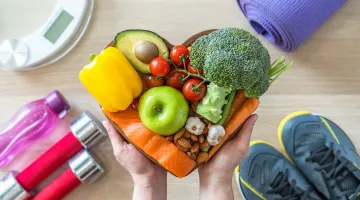Living with Uncertainty during COVID-19
Author

Barbara J. Green, PhD, Youth Health Connection Medical Director
As we enter the sixth month of navigating the COVID-19 pandemic, uncertainty continues to permeate most aspects of our lives.
Things we once took for granted as being everyday tasks — like going to the grocery store, getting a haircut, or seeing a friend — now come with an extra level of stress.
As leaders do their best to get the pandemic under control, it can seem like rules and regulations are changing on a daily basis, adding to the confusion.
In fact, it seems like the only thing that we can be certain of right now is that all of this uncertainty will continue for the foreseeable future.
Most people are creatures of habit, and it makes sense: habits give us a sense of routine, which in turn gives us a sense of control over the world around us.
The uncertainty we all live with now has disrupted those habits and routines, leading to increased anxiety and stress.
With businesses shuttered, vacations put on hold, and uncertainty around heading back to school, it’s easy to feel like all of the familiar things you’ve come to know and love have been replaced by disorder and confusion.
If you find yourself struggling with anxiety or stress, it’s important to know that what you’re feeling is completely normal, and completely understandable.
After all, given the general state of affairs right now, it’d be strange to not feel at least a little bit stressed.
However, it’s important to not let worries about uncertainty consume your daily life. If you’re feeling extra stressed or anxious as the pandemic continues, here are a few things to keep in mind.
It’s okay to unplug.
These days, the unfortunate reality is that there’s no shortage of troubling news out there, from the latest on COVID-19 to issues with the economy.
Due to smartphones, we’re rarely truly disconnected from what’s going on in the world around us, making the troubling news seem like it’s always top of mind.
Social media platforms like Twitter and Facebook, which update automatically with the latest posts, only add to the stress.
In fact, a new term has come up to describe this phenomenon: doomscrolling.
While it isn’t exactly a clinical term, doomscrolling refers to the process of getting stuck in an endless loop of bad news, mainly on social media apps.
It starts with you checking in on the latest news, but often ends with you falling down a rabbit hole of frightening statistics, alarming headlines, and other anxiety-inducing sights.
Needless to say, habits like these can be very taxing on your mental health, and are obvious triggers for anxiety or stress.
There’s value in being informed on current events, but don’t be afraid to walk away for a bit to unplug.
After all, the news will still be there when you get back.
If you have some free time on your hands and find yourself reaching for the phone to check Twitter, consider doing something more relaxing instead: go for a walk, sit in the sun, or call a friend.
This will help satisfy your need for stimulation or activity without triggering anxiety.
Focus on what you can control.
Uncertainty can be difficult to deal with because it often confronts us with the fact that we are not in control of everything around us.
We can do our best to keep key parts of our lives, like our family relationships and our jobs, in order, but there will always be elements of life that are simply beyond our control.
That lack of control is the main driver of the stress and anxiety caused by uncertainty.
It’s simple to say “well, don’t worry about that, it’s out of your control.” However, as anyone who has suffered from anxiety knows, “just don’t worry” is always easier said than done.
If you find yourself beginning to get overwhelmed by uncertainty, it’s a good time to focus on smaller things that are well within the realm of your control.
For example, try to finish that home improvement project you’ve been putting off, or pick up that half-read book and get through the final chapters.
Creating a to-do list can also be a great way to keep yourself centered and to keep your mind focused on the tasks at hand, which can go a long way toward helping you focus on what you can control.
Additionally, to-do lists serve as a way to show yourself all that you’ve accomplished, helping to add some context to what can seem like long, empty days of maintaining social distance.
Also, try to take a moment to be in the moment — try to let yourself “be” without feeling like you have to be doing something or going somewhere.
This can be difficult for some people, but things like deep-breathing exercises, yoga, stretching, or meditation often help.
Maintain your connections.
One of the more difficult and emotional aspects of the uncertainty we currently face is the physical separation from family members and friends.
The time we spend with our loved ones often leads to our most cherished memories.
COVID-19 has robbed us of many of those memories, from canceled graduation parties to birthdays that have been celebrated virtually.
The uncertainty about what’s to come makes things even more difficult, as we’re not sure what will have to be canceled next.
With the holiday season approaching, we’ll have to confront worries that many of our beloved traditions may not be possible.
However, it’s important to not let this uncertainty affect our relationships.
Do your best to maintain connections with the important people in your life whenever possible. Have a video call with your grandmother, sit outside (socially distant, and with a mask!) to catch up with a friend, or call a family member to catch up.
If you’re feeling lonely or isolated, consider the fact that your loved one is likely feeling the same way — and the only way we can combat those feelings is to help one another.
Also, if you regularly see a therapist or counselor, it’s vitally important to maintain that connection as well, even if it’s virtually instead of through in-person visits.
These visits are often essential to overall mental and emotional health, meaning they’ve become even more crucial with all of the stress and anxiety in the world.
Keep up with the basics.
The pandemic has almost certainly uprooted many of your routines, but it’s still important for you to practice good habits when it comes to sleep, nutrition, and other aspects of your overall health.
Maintaining a regular, healthy sleep schedule will go a long way toward improving your focus, mood, and overall mental wellness.
Try to practice healthy nutrition habits whenever possible, and don’t forget to exercise!
Additionally, keep an eye on your substance use. During times of stress, many people turn to substance use as a sort of coping mechanism. In some cases, what started as a way to ease stress can turn into a troubling habit.
Should you find yourself struggling with substance use challenges during COVID-19, please know that there are resources available to help you.
Barbara J. Green, PhD is Medical Director of South Shore Health’s Youth Health Connection.
Author

Barbara J. Green, PhD, Youth Health Connection Medical Director






